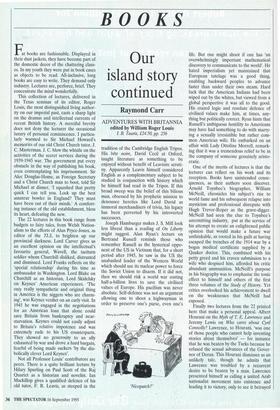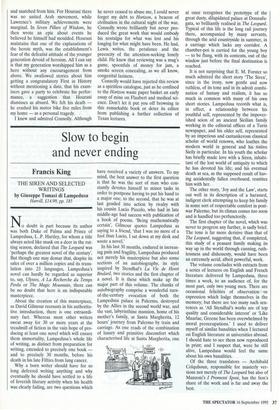BOOKS
Our island story continued
Raymond Carr
ADVENTURES WITH BRITANNIA edited by William Roger Louis I. B. Tauris, £24.50, pp. 256 Et books are fashionable. Displayed in their dust jackets, they have become part of the domestic decor of the chattering class- es. In my youth they were put in book cases as objects to be read. All-inclusive, long books are easy to write. They demand only industry. Lectures are, perforce, brief. They concentrate the mind wonderfully.
This collection of lectures, delivered in the Texas seminar of its editor, Roger Louis, the most distinguished living author- ity on our imperial past, casts a sharp light on the dramas and intellectual currents of recent British history. A merciful brevity does not deny the lecturer the occasional luxury of personal reminiscence. I particu- larly warmed to Sir Michael Howard's memories of our old Christ Church tutor, J. C. Masterman. J. C. blew the whistle on the activities of the secret services during the 1939-1945 war. The government put every obstacle in the way of publishing his book, even contemplating his imprisonment. Sir Alec Douglas-Home, as Foreign Secretary and a Christ Church man to boot, told Sir Michael at dinner, 'I squashed that pretty quick I can tell you. Lock up the best amateur bowler in England? They must have been out of their minds.' A comfort- ing instance of the old establishment, bless its heart, defeating the new.
The 22 lectures in this book range from budgets to fairy tales, from Welsh Nation- alism to the efforts of Alan Pryce-Jones, as editor of the TLS, to brighten up our provincial darkness. Lord Carver gives us an excellent opinion on the intellectual's favourite general, Wavell, the taciturn soldier whom Churchill disliked, distrusted and dismissed. Lord Franks reflects on the `special relationship' during his time as ambassador in Washington. Lord Blake on Churchill as an historian, Lord Slcidelsky on Keynes' American experiences. 'The only really sympathetic and original thing in America is the niggers who are charm- ing', was Keynes verdict on an early visit. In 1945 he was engaged in the negotiations for an American loan that alone could save Britain from bankruptcy and near- starvation. Keynes could not easily adjust to Britain's relative impotence and was extremely rude to his US counterparts. They showed no generosity to an ally exhausted by war and drove a hard bargain, fearful of being made suckers 'by the dia- bolically clever Lord Keynes'.
Not all Professor Louis' contributors are peers. There is a quite brilliant lecture by Hilary Spurting on Paul Scott of the Raj Quartet as a historian and novelist. Ian Mackillop gives a qualified defence of his old tutor, F. R. Leavis, as steeped in the tradition of the Cambridge English Tripos. His bete noire, David Cecil at Oxford, taught literature as something to be enjoyed without benefit of Leavisite scruti- ny. Apparently Leavis himself considered English as a complementary subject to be studied in conjunction with history which he himself had read in the Tripos. If this broad sweep was the belief of this bilious man, obsessed by his prophetic mission to denounce heretics like Lord David as immoral merchandisers of trivia, his legacy has been perverted by his introverted successors.
Joseph Hamburger makes J. S. Mill look less liberal than a reading of On Liberty might suggest. Alan Ryan's lecture on Bertrand Russell reminds those who remember Russell as the hysterical oppo- nent of the US in Vietnam that, for a short period after 1945, he saw in the US the unabashed leader of the Western World which should use its nuclear power to force the Soviet Union to disarm. If it did not, then we should risk a world war costing half-a-billion lives to save the civilised values of Europe. His pacifism was never absolute. Self-defence was not an argument allowing one to shoot a highwayman in order to preserve one's purse, even one's Wicopatch?' life. But one might shoot if one has 'an overwhelmingly important mathematical discovery to communicate to the world'. He hated imperialism yet maintained that European tutelage was a good thing, enabling backward peoples to advance faster than under their own steam. Hard luck that the American Indians had been wiped out by the whites, but viewed from a global perspective it was all to the good. His crazed logic and resolute defence of civilised values make him, at times, any- thing but politically correct. Ryan hints that Russell's ambiguous hostility to Americans may have had something to do with marry- ing a sexually irresistible but rather com- mon American wife. He embarked on an affair with Lady Ottoline Morrell, remark- ing that it was a tremendous relief to be in the company of someone genuinely aristo- cratic.
One of the merits of lectures is that the lecturer can reflect on his work and its reception. Books have unintended conse- quences, as their authors soon discover. Arnold Toynbee's biographer, William McNeill, chronicles his subject's rise to world fame and his subsequent relapse into mysticism and professional disrepute with Hugh Trevor-Roper as the grave-digger. McNeill had seen the clue to Toynbee's unremitting industry, put at the service of his attempt to create an enlightened public opinion that would make a future war unthinkable, as rooted in his guilt at having escaped the trenches of the 1914 war by a bogus medical certificate supplied by a Quaker doctor. This, combined with his petty greed and his craven submission to a wife who despised him, afforded his critic abundant ammunition. McNeill's purpose in his biography was to emphasise the tonic effect to himself and others of the first three volumes of the Study of History. Yet critics overlooked his achievement to dwell on the weaknesses that McNeill had exposed.
Finally two lectures from the 22 printed here that make a personal appeal. Albert Hourani on the Myth of T. E. Lawrence and Jeremy Lewis on Who cares about Cyril Connolly? Lawrence, to Hourani, 'was one of those people who cannot help inventing stories about themselves' — for instance that he was beaten by the Turks because he refused the sexual advances of the Gover- nor of Deran. This Hourani dismisses as an unlikely tale, though he admits that Lawrence was troubled by a recurrent desire to be beaten by a man. Lawrence presented himself as calling a united Arab nationalist movement into existence and leading it to victory, only to see it betrayed and snatched from him. For Hourani there was no united Arab movement, while Lawrence's military achievements were marginal. In Seven Pillars of Wisdom, he then wrote an epic about events he believed he himself had moulded. Hourani maintains that one of the explanations of the heroic myth, was the establishment's fear of the defeatist attitude of the younger generation devoid of heroism. All I can say is that my generation worshipped him as a hero without any encouragement from above. We swallowed stories about him getting a congratulatory First in History without mentioning a date, that his exam- iners gave a party to celebrate his perfor- mance, a suggestion that Hourani dismisses as absurd. We felt his death he crashed his motor bike five miles from my home — as a personal tragedy.
I knew and admired Connolly. Although he never ceased to abuse me, I could never forget my debt to Horizon, a beacon of civilisation in the cultural night of the war. Connolly wrote brilliantly but never pro- duced the great work that would embody his nostalgia for what was lost and his longing for what might have been. He had, Lewis writes, the petulance and the precocity of the attention-seeking lonely child. He knew that reviewing was a mug's game, spoonfuls of money for jam, a smoke screen concealing, as we all know, congenital laziness.
Connolly would have rejected this review as a spiritless catalogue, just as he confined to the Horizon waste paper basket an early essay of mine on Flaubert and medical sci- ence. Don't let it put you off browsing in this remarkable book or deter its editor from publishing a further collection of Texan lectures.



































































 Previous page
Previous page